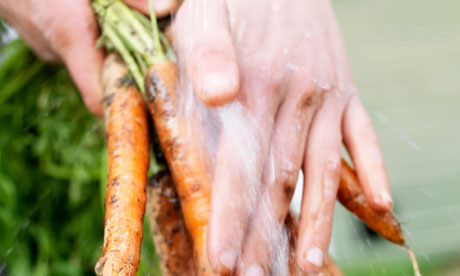
The dilemma
While you might be tempted to bypass the tap and pop that grape into your mouth, fruit and vegetables are not naturally clean. They can be coated by residues from pesticides, and carry bacteria picked up from the soil.
But a recent newspaper report suggested this might be unnecessary. A spokesperson from the Food Standards Agency (FSA) was quoted as saying: "If fruit and vegetables do contain residues, consumers can be confident they are only at levels well below those that might be harmful to health."
So can we save time and stop fussing about cleaning our fruit and vegetables?
The solution
The soil and water in which fruit and vegetables grow can carry harmful bacteria. Fruit and vegetables also get dirty from being transported to warehouses and being squeezed in supermarkets.
When contacted, the FSA didn't know where the quote had come from and were actually about to start a campaign to get people to wash fruit and vegetables. This is because of two outbreaks of E coli earlier this year: one linked to leeks and potatoes that were thought to have been contaminated by soil, and another from sprouted fenugreek seeds (the latter killed 48 people in Germany this summer).
First, make sure you keep perishable fruit and vegetables, such as strawberries and mushrooms, at 0-5C (in the fridge), according to the Food and Drug Administration in America. (There is detailed guidance in the UK from the NHS website but no specific recommendations on how cold your storage needs to be.)
You should wash your hands for 20 seconds with soap and warm water before and after preparing fruit and vegetables. Keep meat and fruit and vegetables apart – do not use the same chopping board or utensils, as bacteria can be passed between them. You should cut away damaged areas of fruit and vegetables because they can harbour bacteria.
Wash fruit and vegetables under running water (even if you are going to peel them, as there may be bacteria on the surface, although you don't need to worry about bananas), and rub them clean, taking care to get rid of soil. Scrub firm fruit and vegetables, such as potatoes, with a brush, and dry them with kitchen roll to reduce the amount of bacteria. Even fruit that doesn't look dirty, such as berries, should be washed. Root vegetables, which are usually cooked, are less likely to cause an E coli illness than salads. Water is adequate: there is no need to use soap or specialist chemical washes.
So you need to wash your fruit and vegetables even more thoroughly than you probably thought. But in case you now think fruit and vegetables are incredibly dangerous, the risk from pesticides giving you cancer in the long term is thought to be minute. And there is only a small risk from getting a gastrointestinal bug from contaminated fruit and vegetables. So don't use it as an excuse to eat crisps instead.

